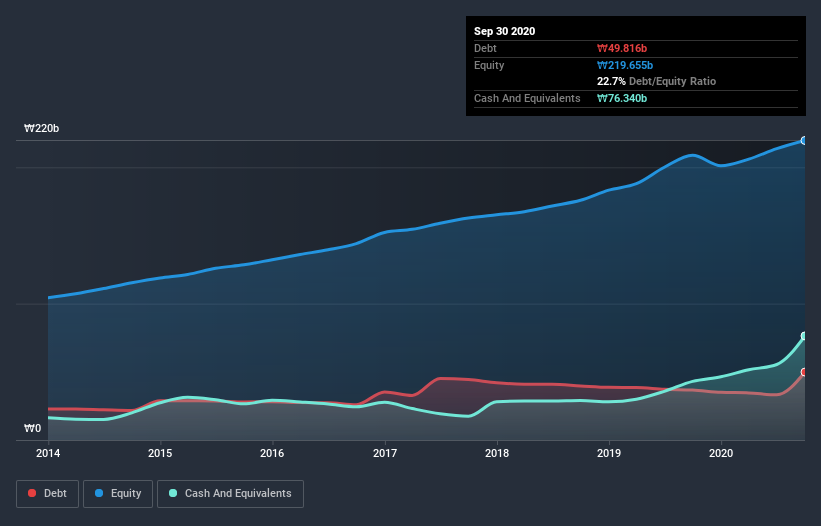Legendary fund manager Li Lu (who Charlie Munger backed) once said, 'The biggest investment risk is not the volatility of prices, but whether you will suffer a permanent loss of capital.' So it seems the smart money knows that debt - which is usually involved in bankruptcies - is a very important factor, when you assess how risky a company is. Importantly, i-SENS, Inc. (KOSDAQ:099190) does carry debt. But is this debt a concern to shareholders?
What Risk Does Debt Bring?
Generally speaking, debt only becomes a real problem when a company can't easily pay it off, either by raising capital or with its own cash flow. In the worst case scenario, a company can go bankrupt if it cannot pay its creditors. However, a more usual (but still expensive) situation is where a company must dilute shareholders at a cheap share price simply to get debt under control. Having said that, the most common situation is where a company manages its debt reasonably well - and to its own advantage. When we think about a company's use of debt, we first look at cash and debt together.
View our latest analysis for i-SENS
What Is i-SENS's Net Debt?
You can click the graphic below for the historical numbers, but it shows that as of September 2020 i-SENS had ₩49.8b of debt, an increase on ₩36.7b, over one year. However, it does have ₩76.3b in cash offsetting this, leading to net cash of ₩26.5b.

A Look At i-SENS's Liabilities
We can see from the most recent balance sheet that i-SENS had liabilities of ₩37.4b falling due within a year, and liabilities of ₩44.4b due beyond that. Offsetting these obligations, it had cash of ₩76.3b as well as receivables valued at ₩40.8b due within 12 months. So it can boast ₩35.4b more liquid assets than total liabilities.
This surplus suggests that i-SENS has a conservative balance sheet, and could probably eliminate its debt without much difficulty. Simply put, the fact that i-SENS has more cash than debt is arguably a good indication that it can manage its debt safely.
On the other hand, i-SENS saw its EBIT drop by 6.1% in the last twelve months. That sort of decline, if sustained, will obviously make debt harder to handle. The balance sheet is clearly the area to focus on when you are analysing debt. But ultimately the future profitability of the business will decide if i-SENS can strengthen its balance sheet over time. So if you're focused on the future you can check out this free report showing analyst profit forecasts.
But our final consideration is also important, because a company cannot pay debt with paper profits; it needs cold hard cash. i-SENS may have net cash on the balance sheet, but it is still interesting to look at how well the business converts its earnings before interest and tax (EBIT) to free cash flow, because that will influence both its need for, and its capacity to manage debt. Over the most recent three years, i-SENS recorded free cash flow worth 75% of its EBIT, which is around normal, given free cash flow excludes interest and tax. This cold hard cash means it can reduce its debt when it wants to.
Summing up
While it is always sensible to investigate a company's debt, in this case i-SENS has ₩26.5b in net cash and a decent-looking balance sheet. And it impressed us with free cash flow of ₩26b, being 75% of its EBIT. So is i-SENS's debt a risk? It doesn't seem so to us. When analysing debt levels, the balance sheet is the obvious place to start. However, not all investment risk resides within the balance sheet - far from it. For instance, we've identified 1 warning sign for i-SENS that you should be aware of.
If, after all that, you're more interested in a fast growing company with a rock-solid balance sheet, then check out our list of net cash growth stocks without delay.
If you’re looking to trade i-SENS, open an account with the lowest-cost* platform trusted by professionals, Interactive Brokers. Their clients from over 200 countries and territories trade stocks, options, futures, forex, bonds and funds worldwide from a single integrated account. Promoted
Valuation is complex, but we're here to simplify it.
Discover if i-SENS might be undervalued or overvalued with our detailed analysis, featuring fair value estimates, potential risks, dividends, insider trades, and its financial condition.
Access Free AnalysisThis article by Simply Wall St is general in nature. It does not constitute a recommendation to buy or sell any stock, and does not take account of your objectives, or your financial situation. We aim to bring you long-term focused analysis driven by fundamental data. Note that our analysis may not factor in the latest price-sensitive company announcements or qualitative material. Simply Wall St has no position in any stocks mentioned.
*Interactive Brokers Rated Lowest Cost Broker by StockBrokers.com Annual Online Review 2020
Have feedback on this article? Concerned about the content? Get in touch with us directly. Alternatively, email editorial-team@simplywallst.com.
About KOSDAQ:A099190
i-SENS
Engages in the development, manufacture, and sale of sensors and measuring instruments based on electrochemical and biosensor technologies in South Korea and internationally.
Reasonable growth potential and fair value.
Similar Companies
Market Insights
Community Narratives



